Entrepreneurs
Pallav Agarwal Building a Global Data Centre Firm against All Odds

Pallav Agarwal’s remarkable journey from humble beginnings to becoming the founder of HTS Solutions, a thriving data centre company with a global presence, is a testament to his unwavering determination and entrepreneurial spirit. Despite facing adversity, Pallav’s commitment to success has propelled him to new heights in the tech industry.
Pallav Agarwal’s early life was marked by financial constraints that prevented him from pursuing higher education despite securing a decent rank in AIEEE. With no resources to continue his studies, he joined a call centre to support his family.
The Call Centre Days:
Pallav’s initial job at a call centre offered him a meagre salary of Rs 5,000. Despite the financial constraints, he persevered and eventually secured a position at HCL Technologies, a reputed company in the tech industry.
Pallav’s ambition led him to seek career growth within HCL. However, he realized that having influential references was crucial for advancement. During this time, he started taking on freelance web design projects to gain experience and income.
The Birth of HTS Solutions:
In 2013, Pallav took a leap of faith and founded HTS Solutions as a sole proprietorship. He utilized his savings and technical skills to establish the company, initially focusing on web development.
Building HTS Solutions was not without its challenges. Pallav struggled to hire candidates who shared his vision. He decided to convert the company into a private limited entity, which required additional investment but ultimately paid off in building trust among employees.
Diversification and Growth:
By 2015, HTS Solutions had achieved positive growth. Pallav expanded the company’s services to include CRM, ERP, and payroll software development. In 2017, they ventured into leasing and renting hosting services, identifying an opportunity to serve clients more effectively.
In 2019, HTS Solutions took a significant step by establishing its own data centre, becoming one of the first entirely homegrown data centres in India. This move allowed the company to offer hosting services directly to clients, providing real-time solutions.
Global Expansion:
Today, HTS Solutions serves clients worldwide, including the US, the UK, Turkey, and more. Pallav noted significant revenue growth and a 100 percent increase in business this year, although specific turnover figures were not disclosed.
Despite his achievements, Pallav acknowledges the challenges his company faces in terms of visibility and marketing. Limited funds and resources have made it challenging to compete for attention in a crowded market. Additionally, customers in India often prioritize discounts over service quality, affecting operating costs.
Looking ahead, Pallav aims to expand HTS Solutions globally through partnerships and investments. He envisions taking this entirely “Made in India” company to the global stage, highlighting his commitment to success against all odds.
Conclusion:
Pallav Agarwal’s inspirational journey from a call centre employee to the founder of a successful data centre company showcases the power of determination and entrepreneurial spirit. His story serves as a testament to what can be achieved with unwavering commitment, even in the face of adversity. As Pallav continues to steer HTS Solutions towards global success, his story inspires others to pursue their dreams relentlessly.
